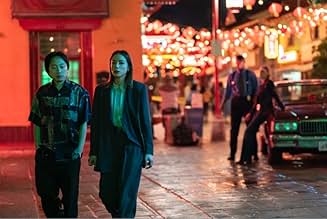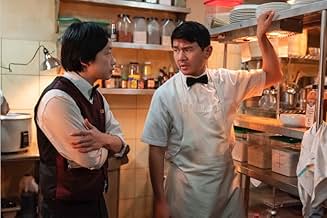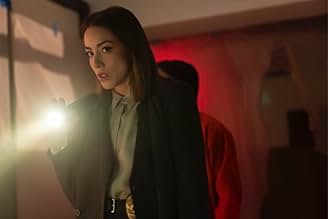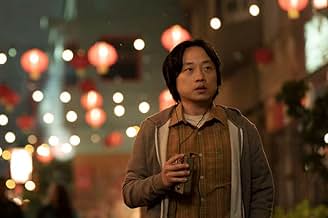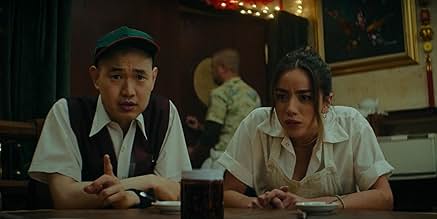Segue un attore asiatico-americano che lotta contro ruoli e stereotipi cliché, sia sul lavoro che nella vita personale.Segue un attore asiatico-americano che lotta contro ruoli e stereotipi cliché, sia sul lavoro che nella vita personale.Segue un attore asiatico-americano che lotta contro ruoli e stereotipi cliché, sia sul lavoro che nella vita personale.
- Premi
- 1 vittoria e 1 candidatura in totale
Sfoglia gli episodi
Recensioni in evidenza
It's tough to describe this show, which is probably why I feel like all the descriptions that I've read don't quite seem to fit. The way it plays with its premise, it's rather ambiguous as to how the "show within the show" really works: there's reality mixed with television, seriousness mixed with absurdity. The lines are often blurred, which is a strength. It can be a little confusing, but it's one of those premises where sometimes you just have to stop trying to overthink and enjoy it for what it is. They do a good job of easing into the concept and keeping the logic consistent. The writing is very good, the humor is abundant, and the acting is great. This is a great cast, and no character goes to waste. Good pacing, good direction. The episodes fly by. I can see why this might not be for some, but for me it's one of the best new shows I've seen in a long time.
I understand the original book was a reaction to the author's perception that East Asian characters on TV were flat and generic. That message translates to this show but is definitely not preachy or woke. In fact there's a lot of humour.
Although Willis Wu is the principal character, I think a lot of the entertainment values come from the supporting ensemble.
Green and Turner, the uber-stereotyped buddy cops who started to question whether crimes were solving themselves. Willis parents given depth as a later life crisis couple mourning the death of Willis older brother.
The tricks ( no spoiler) Willis uses to penetrate the precinct station were hilarious. Ditto the fun poked at police forensics as they appear on TV.
All round a good show.
Although Willis Wu is the principal character, I think a lot of the entertainment values come from the supporting ensemble.
Green and Turner, the uber-stereotyped buddy cops who started to question whether crimes were solving themselves. Willis parents given depth as a later life crisis couple mourning the death of Willis older brother.
The tricks ( no spoiler) Willis uses to penetrate the precinct station were hilarious. Ditto the fun poked at police forensics as they appear on TV.
All round a good show.
Within one episode I usually know whether I'm going to stick with a show. "Interior Chinatown" is different. After watching 2 episodes, the jury's still out. So, what is this show about? The themes (so far) appear to be: what happens when we become personally defeated, how to offer support to others, and discovering our life's purpose and potential. This highly stylized show is a blend of fantasy, satirical comics, and slick Hollywood sets. The combo will work for some viewers. For others, it will be a sensory overload. Does this show overreach to impress and seduce the viewer? You be the judge.
First, some positives: outstanding set design and lighting. The quirky, effective music sets the tone. Overall the cast is apt, but several characterizations fall flat, primarily due to the direction. My favorite characters are Jimmy O. Yang as Willis (the central role), his buddy Fatty (Ronny Chieng), and Jimmy's dad (Tzi Ma).
One major drawback for me: the writing is uneven. There are some genuinely funny moments, but certain scenes go overboard with the physical gags. One example is when Willis attempts to enter a building... it drags on for way too long.
A few minor elements are dissuading: the amount of stuff jammed into the darkened homes of several Chinese characters is ridiculous. So they look like hoarders, just because they live in an older, cramped building in a sketchy area of town? Give me a break! Next: the heavy cosmetics on the lead detective (played by Lisa Gilroy) is too perfectly applied, which overplays the stereotype of typically attractive females in detective shows.
First, some positives: outstanding set design and lighting. The quirky, effective music sets the tone. Overall the cast is apt, but several characterizations fall flat, primarily due to the direction. My favorite characters are Jimmy O. Yang as Willis (the central role), his buddy Fatty (Ronny Chieng), and Jimmy's dad (Tzi Ma).
One major drawback for me: the writing is uneven. There are some genuinely funny moments, but certain scenes go overboard with the physical gags. One example is when Willis attempts to enter a building... it drags on for way too long.
A few minor elements are dissuading: the amount of stuff jammed into the darkened homes of several Chinese characters is ridiculous. So they look like hoarders, just because they live in an older, cramped building in a sketchy area of town? Give me a break! Next: the heavy cosmetics on the lead detective (played by Lisa Gilroy) is too perfectly applied, which overplays the stereotype of typically attractive females in detective shows.
Interior Chinatown is a brilliant yet understated reflection of the world-a mirror that exposes how society often judges people by their covers. The show captures this poignantly with the scene where Willis Wu can't get into the police precinct until he proves his worth by delivering food. It's a powerful metaphor: sometimes, if you don't fit the mold, you have to prove your value in the most degrading or unexpected ways just to get a foot in the door. The locked precinct doors represent barriers faced by those who don't match the "majority's" idea of what's acceptable or valuable.
While the series centers on the Asian and Pacific Islander (API) community and the stereotypical roles Hollywood has long relegated them to-background extras, kung fu fighters-it forces viewers to confront bigger questions. It makes you ask: Am I complicit in perpetuating these stereotypes? Am I limiting others-or even myself-by what I assume is their worth? It's not just about API representation; it's about how society as a whole undervalues anyone who doesn't fit neatly into its preferred narrative.
The show can feel confusing if you don't grasp its satirical lens upfront. But for me, knowing the context of Charles Yu's original book helped it click. The production team does an incredible job balancing satire with sincerity, blurring the line between real life and the exaggerated Hollywood "procedural" format. They cleverly use contrasting visuals and distinct camera work to draw you into different headspaces-Hollywood's glossy expectations versus the grittier reality of life.
Chloe Bennet's involvement (real name Chloe Wang) ties into the show's themes on a deeply personal level. She famously changed her last name to navigate Hollywood, caught in the impossible middle ground of not being "Asian enough" or "white enough" for casting directors. It's a decision that sparks debate-was it an act of survival, assimilation, or betrayal? But for Bennett, it was about carving a space for herself to pursue her dreams.
This theme echoes in one of the show's most poignant scenes, where Lana is told, "You will never completely understand. You're mixed." It's a crushing acknowledgment of the barriers that persist, even when you're trying to bridge divides. Lana's story highlights how identity can be both a strength and an obstacle, and the line serves as a painful reminder of the walls society creates-externally and internally.
Interior Chinatown doesn't just ask us to look at the system; it forces us to examine ourselves. Whether it's Willis Wu at the precinct door or Lana trying to connect in a world that sees her as neither this nor that, the show unflinchingly portrays the struggle to belong. And as viewers, it challenges us to question our role in those struggles: Are we helping to dismantle the barriers, or are we quietly reinforcing them?
While the series centers on the Asian and Pacific Islander (API) community and the stereotypical roles Hollywood has long relegated them to-background extras, kung fu fighters-it forces viewers to confront bigger questions. It makes you ask: Am I complicit in perpetuating these stereotypes? Am I limiting others-or even myself-by what I assume is their worth? It's not just about API representation; it's about how society as a whole undervalues anyone who doesn't fit neatly into its preferred narrative.
The show can feel confusing if you don't grasp its satirical lens upfront. But for me, knowing the context of Charles Yu's original book helped it click. The production team does an incredible job balancing satire with sincerity, blurring the line between real life and the exaggerated Hollywood "procedural" format. They cleverly use contrasting visuals and distinct camera work to draw you into different headspaces-Hollywood's glossy expectations versus the grittier reality of life.
Chloe Bennet's involvement (real name Chloe Wang) ties into the show's themes on a deeply personal level. She famously changed her last name to navigate Hollywood, caught in the impossible middle ground of not being "Asian enough" or "white enough" for casting directors. It's a decision that sparks debate-was it an act of survival, assimilation, or betrayal? But for Bennett, it was about carving a space for herself to pursue her dreams.
This theme echoes in one of the show's most poignant scenes, where Lana is told, "You will never completely understand. You're mixed." It's a crushing acknowledgment of the barriers that persist, even when you're trying to bridge divides. Lana's story highlights how identity can be both a strength and an obstacle, and the line serves as a painful reminder of the walls society creates-externally and internally.
Interior Chinatown doesn't just ask us to look at the system; it forces us to examine ourselves. Whether it's Willis Wu at the precinct door or Lana trying to connect in a world that sees her as neither this nor that, the show unflinchingly portrays the struggle to belong. And as viewers, it challenges us to question our role in those struggles: Are we helping to dismantle the barriers, or are we quietly reinforcing them?
Ok so I'm like a guy who casually watches television and comes on here to look at trivia and some reviews. I never thought I had to come on here and make a review but for this show I'm happy to. This is a show for the people that are more akin to a Rick and Morty with the way if you watch from afar it'll look like total chaos and no plot but if you try to watch and look for the little things in the direction, dialogue, and the music choices you'll possibly see the brilliance that was made into this show. I need season 2. All I ask is more marketing so people can see. Well all I can say now is be nice to people and be nice to yourself have a good one.
Lo sapevi?
- QuizEarly in the series, Willis (Jimmy O. Yang), Fatty (Ronny Chieng), and Carl (Chau Long) see Detective Lana Lee (Chloe Bennet) on TV and debate her possible ethnicity: Carl declares, "she looks Thai," while Fatty argues, "Dude, she's clearly Korean. Know your Asians." In fact, Bennet is the child of a white mother and a Chinese father. Earlier in her acting career she changed her last name from Wang to Bennet (her father's first name) after encountering casting agents who said they were unable to cast her as Asian or Asian American characters, but her name precluded her consideration for white characters either.
I più visti
Accedi per valutare e creare un elenco di titoli salvati per ottenere consigli personalizzati
- How many seasons does Interior Chinatown have?Powered by Alexa
Dettagli
- Colore
- Mix di suoni
- Proporzioni
- 16:9 HD
Contribuisci a questa pagina
Suggerisci una modifica o aggiungi i contenuti mancanti

Divario superiore
What is the Canadian French language plot outline for Interior Chinatown (2024)?
Rispondi




